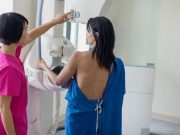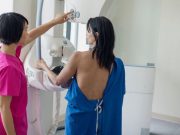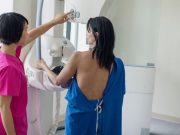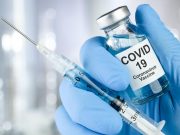Tag: Mammography
AI Assistance May Improve Accuracy of Breast Cancer Screening
Sensitivity increased for subgroups with small lesion sizes, invasive carcinomas
Diagnostic Mammogram Performance Varies by Race/Ethnicity
Invasive cancer detection rates, positive predictive values highest for non-Hispanic Whites, lowest for Hispanics
Factors ID’d in Time to Breast Biopsy by Race, Ethnicity
Multilevel factors examined for differences in time from abnormal screening mammogram to biopsy by race, ethnicity
Study Compares DBT With Digital Mammography Screening
Digital breast tomosynthesis linked to lower risk of advanced breast cancer for women with extremely dense breasts, high risk for breast cancer
Screening Mammography Levels Not Fully Restored After Pandemic Drop
While mammography, biopsies, and cancer diagnoses are up from 2020 lows, none have reached pre-COVID-19 volumes
AI May Help Detect Breast Cancer in Mammography Screening Program
Performance of AI system for detecting breast cancers promising in setting of large population-based mammography screening program
Breast Cancer Risk Up With Dense Breasts, Benign Breast Disease
Elevated risk also seen for benign breast disease and fatty breasts and extremely dense breasts without benign breast disease
Consider COVID Vax History When Assessing Adenopathy on Mammo
Axillary lymphadenopathy more likely within 14 days after vaccination; persistent axillary lymphadenopathy seen up to 43 weeks later
Probability of False-Positives Lower With Digital Breast Tomosynthesis
Cumulative probabilities of false-positive results substantially lower for biennial versus annual screening, regardless of modality
Breast Arterial Calcification on Mammography Tied to CVD Risk
The presence of breast arterial calcification on routine mammography in postmenopausal women may indicate increased cardiovascular risk














